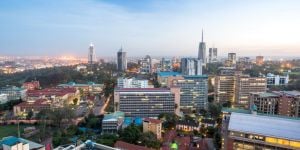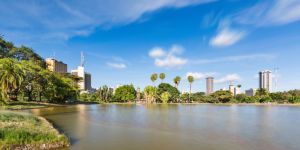Buying land in a foreign country.
Last activity 03 March 2019 by Longonot62
1972 Views
12 replies
Subscribe to the topic
Post new topic
Hi,
So you get to a foreign country and the first thing you want to look for is a house which you can make a home. What is your take on purchasing land and building a home versus buying an apartment or already built house?
As a lawyer I can advise you to be very careful in any transaction you're carrying especially in regards to land. Do proper search through a reputable lawyer before deciding whether to build or buy. The other question is how long do you want to stay in that country. There is no need of buying a property you're going to use for two years. You can take a property for a lease period. It is a bit cost effective. Kindly reach me for help.
Having bought (and sold) land and property in Kenya, I would echo what is written above. Never ever allow someone else to act on your behalf. Be present and personally view the land or property.
With land, its not unknown for titles to be false and a piece of land to be 'sold' by someone purporting the be the owner, but who isn't. At the very least you will lose your deposit - you will not get your money back. Thorough checks/searches cannot be recommended strongly enough (as stated above).
Land and property is an excellent investment, so even if you are in Kenya for 2 years and you have the cash, it is certainly worth considering a purchase.
I would tend to go for an already built house or apartment, then remodel/update it. Build costs in Kenya are high and inevitably you will need to add considerably to your original budget estimate - particularly for finishing. Good and reliable fundi's are hard to find and as your project nears completion, they may 'buy time' by working more slowly until they get another contract, when you won't see them at all for most of the week.
Being on site to project manage is very important.
If you are simply re-modelling/updating a house, you can at least live in part of it while the rest is being worked on!!
Lastly, don't forget that foreigners cannot own freehold land in Kenya any more.
That's very true I concur with you well endowed wisdom
Hi Claire,
I basically agree with all that have been said about purchasing land.
I've to slightly disagree though on the building costs issue.
It's true that there're a lot of unreliable builders here in Kenya (as in a lot of other countries though, what Kenya lack mostly is a good system of building regulations), anyway as an "expat" practicing architect here on the coast of Kenya I must say that the building costs can be kept substantially lower than in Europe especially if you hire the right person to control the building phase.
Here on the coast for example you can have a nice quality house for as low as 40.000 Kshs per sqm up to a luxury finish quality for 70.000 to 80.000 Kshs per sqm.
In Nairobi is slightly more expensive but still relevantly cheaper than in a capital city in any western country. In Milan for example you usually start from 1.000 Euro for sqm. for a basic structure without finishes.
As my experience here I must also point out that due to the general lack of good planned apartments and houses, buying an existing building with the idea of renovating it could be much more expensive than starting from scratch.
Good luck with your search anyway,
Roberto
I have recently purchased land in Kenya; I have a Kikuyu wife and we are co-directors of a company; the company owns the land. Before buying land: you need a real estate agent and you need to look at the land yourself; you need a lawyer who is highly experienced in land transactions who will thoroughly, repeat thoroughly, investigate the ownership trail of the land.
What type of land? Being the co-director of a company, with your Kenyan wife still means that in the eyes of the law, your company is a foreign company - it is only companies wholly owned by Kenyans that are classed as 'Kenyan companies'.
Foreign companies can buy land, but it must be leasehold (99 year lease) and not gazetted for agriculture. If your land isn't either of these, then the deal may not be legally valid.
It's freehold, and this is not a problem per my lawyer, who is an expert in the field.
It's freehold and is in an agricultural area, which is not a problem according to our lawyer, who is an expert in the field. What you mean by "gazetted" in this context I have no idea.
I think some Kenyan laws can be confusing due to the new constitution which states many new ways of doing things but not yet law, at least on the ground. Example: I purchased an apartment with my Kenyan wife which had 999 years lease originally, it still has 990 or so remaining. All land according to the law in Nairobi supposed to be maximum lease of 99 years including Kenyan nationals.
I don't get too involved as I let my wife do most things regards to these things In Kenya. I just read in another thread no foreigners can open bank accounts yet a few months ago I was added to a bank account and told no problem in opening another account. I'm a foreigner and visit just a month a year or so.
Andrew
No, the leasehold law doesn't apply to Kenyan nationals. They can own land and property freehold, but not in partnership with a foreign national.
Mrenglish: 'gazetted' means listed/classified. In Kenya, land is gazetted for certain uses, so agricultural, residential, commercial, road reserves and so on. If your land is in an agricultural area, it MUST be gazetted as residential for you to legally be able to own it. If its freehold, the freehold should be ended and converted to a 99 year lease, by Land Registry, under the terms of the constitution.
Quite a lot of previously large farms have been broken up into smaller plots and sold off for residential development. Part of this would involve the government approval of a change of use.
Under the old constitution, foreigners could buy freehold residential land. Land Registry are supposed to have undertaken a process to convert all the foreign purchases of land from freehold to leasehold, but the department has been mired in inefficiency and corruption for years. However, foreigners have NEVER been permitted to own agricultural land. You need to apply for and have permission from the President to purchase/own agricultural land.
How can you be sure that your lawyer is an 'expert'? The legal position on land ownership is very clear and there for anyone with a computer to search for and read. My experience with lawyers is that you shouldn't necessarily solely rely on their advice - they are all 'experts' when it comes to your transaction.
If the transaction is irregular, then you may well run into problems down the line when you try and register it, or come to sell. Land Registry are currently engaged in an overhaul and introduction of an e-platform, to improve efficiency.
Where we have purchased freehold agricultural land, the title has always been solely in my wife's name, for the reasons stated above. Once she has come to sell, she was not permitted to do this without my written agreement - which is also usual. We have not been permitted to jointly hold titles for agricultural land...........and we have bought and sold quite a few plots over the years.
Building a Home on Your Own
A house is often the largest investment the fact that a person makes. Most buyers finish up spending lots of time and money either designing a perfect home. Location, price, property taxes and of course the condition of the property is factored for the house search.
This reference might be helpful in choosing http://hayerone.com/build-or-buy-house-in-kenya/
Buying a Flat or an Apartment
The reason an apartment could be a better option is if you'd like to actually live in a particular developed neighborhood – near work, school, family. Probability is, too, the fact that the home will have mature landscaping, therefore you will not need to be worried about commencing a lawn, planting flowers and watching for trees to rise. For those of you who want to dwell close to town, the best option will certainly be an apartment since the majority of options.
Already Built in House
If you are going to invest in an already built in house, this could be a good choice. But for doing that you should have expertise in property inspection and so on. You can't make a mistake in such a situation. The better choice will be that go along some local who knows the actual value of property in that particular area and can help you get a good deal.
Conclusion
Regardless of the fact that the present home sales market is performing well, constructing a new house remains viable. The most costly part is building materials. It is undoubtedly, therefore, a good idea to try to find land to build in a location with affordable local benefits in order to help reduce costs. If the answer is yes, investing in an apartment is the greatest choice you can also make without having a second doubt in mind.
"You can't make a mistake in such a situation."
Yes you can; the house might be on a road reserve, river reserve or on a previously stolen title, leading to the loss of all your money. You must be very very careful to ensure that the title is clean and the searches thorough (and that you see the results). There was a lot of illegal construction and corruption in the 80's and 90's.
An example: we bought a property in Thika in 2008, which we sold in around 2012. The title was apparently clean and there were no problems with the transaction. Now, the current owner has been served notice that the property (along with all the others on the same row) are on a road reserve....................
Articles to help you in your expat project in Kenya
 Buying property in Kenya
Buying property in KenyaAlthough many expats moving to Kenya may prefer the convenience of renting property, expats and non-Kenyan ...
 Accommodation in Nairobi
Accommodation in NairobiMany expats moving to Kenya are likely to find themselves relocating to Nairobi, as it is both the nations capital ...
 Marriage in Kenya
Marriage in KenyaIf you are planning a marriage in Kenya, the Registrar of Marriages in Nairobi is the best starting point for ...
 Leisure activities in Kenya
Leisure activities in KenyaNew expats to Nairobi will find plenty of things to see and do, from museums, national parks, sporting events, and ...
 Requirements for Foreigners to Live and Work in Kenya
Requirements for Foreigners to Live and Work in KenyaREQUIREMENTS FOR FOREIGNERS TO OWN A BUSINESS IN KENYA
 Moving with your pet to Kenya
Moving with your pet to KenyaPets are considered an important part of the family, and many expats wish to bring their cat or dog with them when ...
 Driving in Kenya
Driving in KenyaExpats are legally able to drive in Kenya, but will find many challenges, including high accident rates and road ...
 kenya (yetu)
kenya (yetu)Kenya is a beautify country, and you should travel light, carry as little cash as possible.
Find more topics on the Kenya forum



